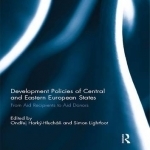Development Policies of Central and Eastern European States: From Aid Recipients to Aid Donors
BookThis item doesn’t have any media yet
2015 | Business & Finance
The states from Central and Eastern Europe that joined the EU in 2004 and 2007 provide a fascinating series of case studies for scholars interested in politics, IR and development studies. The interest comes from the fact that never before had so many recipients of EU aid joined the Union and taken on the commitment to become aid donors. The journey from recipients of aid to aid donors is interesting because, not only does it tell us about development policy in CEE states, this policy area gives us an insight into governmental structures in CEE states, foreign policy priorities, public opinion, the role of NGOs/civil society and how well CEE states have taken on board the EU acquis (the EU's rule book). The book also explores whether the development cooperation programmes of the majority of CEESs reflect the so-called "transition experience" of moving from authoritarianism and socialism to democracy and modern liberalism. It also explores the extent to which these donors are aligned with the approaches of the DAC donors.
Finally, by extending the scrutiny to the bottom-up development activities of non-state actors and public opinion, the book will analyse the dynamics of the solidarity of the former 'East' with the global 'South'. This book was published as a special issue of Perspectives on European Politics and Society
Related Items:
| Published by | Taylor & Francis Ltd |
| Edition | Unknown |
| ISBN | 9781138945104 |
| Language | N/A |
Images And Data Courtesy Of: Taylor & Francis Ltd.
This content (including text, images, videos and other media) is published and used in accordance
with Fair Use.
